2010 江苏省南京市中考英语真题及答案
注意事项:
1. 本试卷共 9 页。全卷满分 96 分。考试时间 120 分钟。试题包含选择题和非选择题。考
生答题全部答在答题卡上,答在本试卷上无效。
2. 请认真核对监考教师在答题卡上所粘贴条形码的姓名、考试证号是否与本人相符合,
再将自己的姓名、考试证号用 0.5 毫米黑色墨水签字笔填写在答题卡及本试卷上。
3. 答选择题必须用 2B 铅笔将答题卡上相对应的答案标号涂黑。如需改动,请用橡皮擦干
净后,再选涂其他答案。答非选择题必须用 0.5 毫米黑色墨水签字笔写在答题卡的指
定位置,在其他位置答题一律无效。
选择题(共 45 分)
一、单项填空(共 15 小题;每小题 1 分,满分 15 分)
从 A、B、C、D 四个选项中,选出可以填入空白处的最佳选项,并在答题卡上将该项涂黑。
1. There is _______ local shop for people to buy daily things in the small village.
A. a
B. an
C. the
D. 不填
2. Marie Curie, the first woman to win the Nobel Prize, was born ______ November,
1867, in the city of Warsaw in Poland.
A. at
B. on
C. in
D. to
3. — _______ beautiful day it is! Let’s go and have a picnic in the park.
— Good idea!
A. How
C. What
4. — Is this model plan yours, Susan?
B. How a
D. What a
— Yes, it’s mine. It’s made by ______.
A. myself
B. yourself
C. himself
D. herself
5. — Did you love your day trip?
— Yes, we enjoyed the roller coaster _______ of all.
D. less
B. little
A. most
C. more
6. It’s the library! So you ______ know shouting is not allowed here.
A. can
B. must
C. need
D. may
7. World Expo 2010 Shanghai China _______ people from all over the world to the
theme “ Better City, Better Life.”
A. attends
B. attracts
C. allows
D. advises
8. — Peter has good grades in all his subjects, but he never shows off.
— I agree. He is very ______.
A. easy-going
B. imaginative
C. modest
D. generous
9. — I hear Sam has gone to Qingdao for his holiday.
— Oh, how nice! Do you know when he _______?
A. left
B. was leaving
C. has left
D. had left
10. — Can you sing this English song?
— Of course, I can. It _______ many times on the radio.
A. taught
B. has taught
C. is taught
D. has been taught
11. — I don’t think your uncle really likes drama series.
— No, _______ he still watches the programme.
�
A. and
B. so
C. or
D. but
12. — Do you know _______ the girl in red is?
— I’m not sure. Maybe a teacher.
A. when
B. how
C. where
D. what
13. — Many students don’t know how to _______ stress and become worried.
— I think they’d better ask their teachers for help.
A. argue with
B. deal with
C. quarrel with
D. come up with
14. — Are you confident about this evening’s performance, Katie?
— ________. I’m will prepared and feel I’ve got everything ready.
A. I hope so
B. It’s hard to say
C. Sure, I am
D. I am afraid not
15. — I am very worried about tomorrow’s maths test. I am afraid I can’t pass
this time.
— ________! I’m sure you’ll make it.
A. No problem
B. That’s right
C. Cheer up
D. Don’t mention it
二、完形填空(共 10 小题;每小题 1 分,满分 10 分)
阅读下面短文,从短文后所给各题的四个选项(A、B、C 和 D)中,选出可以填入空白
处的最佳选项,并在答题卡上将该项涂黑。
If we take a close look at successful language learners, we may discover a few
techniques (技巧) which make language learning easier for them.
16
, successful language learners are independent learners. They do not
their own way to learn the language.
depend on (依赖) books or teachers; they
They try to find the patterns and the rules for themselves.
waiting for the
teacher to explain everything. They are good guessers who look for clues to form
their
conclusions which are very different from others.
17
18
19
20
Successful language learning is
learning. Therefore, successful
such a chance.
learners do not wait for a chance to use the language; they
They find people who speak the language and ask these people to correct them
22
they make mistakes. They will try anything to communicate. When communication is
information that is incomplete (不完整的). It is more
difficult, they can
important for them to learn to
in the language than to know the meaning of
every word.
21
24
23
25
Finally, successful language learners are learners with a
in order to
communicate with these people and learn from them. They want to learn a language
because they are interested in the language and the people who speak it. It is
necessary for them to learn the language.
16. A. As usual
17. A. explain
18. A. instead of
19. A. correct
20. A. ideal
21. A. look for
22. A. until
23. A. break
24. A. agree
B. First of all
B. make
B. after
B. own
B. informal
B. care about
B. whether
D. active
D. write down
D. when
D. accept
D. read
C. download
C. think
B. check
B. ask
C. By the way
C. because of
C. work out
C. discover
D. So far
C. before
D. change
D. from
C. only
C. early
D. main
�
25. A. purpose
三、阅读理解(共 20 小题;每小题 1 分,满分 20 分)
B. certificate
C. guide
D. question
阅读下列材料,从每题所给的四个选项(A、B、C 和 D)中,选出最佳选项,并在答题
卡上将该项涂黑。
Presents For Children’s Day
A
On sale!
Charles M. Schulz was born in 1922 in Minneapolis, the only child of a housewife
and a barber. His interest in comics was encouraged by his father, who loved the
funny pages. Charles M. Schulz sold seventeen cartoons to the Saturday Evening Post
from 1948 to 1950 and Li’lFolksto the St. Paul Pioneer Press. Peanuts debuted(首
次露面) on October 2, 1950, and ran without interruption(中止) for the next fifty
years. Charles M. Schulz died in 2000.
It’s a Dog’s Life. Snoopy
brings all your
familiar
friends together for great
times and fun.
life’s
Charlie Brown faces some
of
little challenges
with the help of Snoopy,
Lucy,
Patty,
Linus, and the rest of the
gang( 一 伙 ) in It’s a Big
World, Charlie Brown.
Peppermint
The last one is the special
edition Peanuts
2000,
which includes all the last
year’s
comic
and Charles M.
strip
Schulz’s famous farewell
strip.
Peanuts
Come and visit out website at .ballantinebooks
or come to Ballantine Bookshop, you’ll have a big surprise.
26. Why did young Charles become interested in comics?
A. He wanted to sell cartoons.
B. His mother encouraged him.
C. Cartoons brought him great times and fun.
D. His father’s love for the funny pages influenced him.
27. When did Peanuts first appear in public?
A. In 1922.
B. In 1948.
C. In 1950.
D. In 2000.
28. Who doesn’t belong to the Peanuts gang?
B. Lucy.
A. Snoopy.
�
C. Charles M. Schulz.
D. Peppermint Patty.
29. Which of the following appeared last?
A. Peanuts 2000.
C. It’s a Dog’s Life, Snoopy.
30. What do you think the passage is?
B. Li’l Folks.
D. It’s a Big World, Charlie Brown.
A. A novel.
B. A menu.
C. A diary.
D. An advertisement.
B
An Englishman named Phil Shaw invented extreme ironing in 1997 because he was
bored doing ironing at home.
Extreme ironing is a special kind of outdoor sport. It combines(使结合) danger
and excitement with practical ironing.
Who does extreme ironing? People all over the world who likes danger do it.
There are about 1,000 people around the world who do extreme ironing. There are
extreme ironing clubs and groups in Britain, Germany, South Africa, New Zealand
and the United States. You don’t have to have any special qualifications(资格
证明) to do it. In fact, anyone can do it. However, it is better to start ironing
in your back yard(院子) before you start to iron on top of a mountain.
There are, of course, some rules in extreme ironing. The ironing must be
outdoors. You must take an iron, and ironing board, and something that you actually
iron to get the wrinkles out. Outdoors includes faraway and unusually places, such
as on top of a mountain, while skiing, snowboarding, skydiving, or under water.
There are no limits. The more unusual the better. However, you should plan carefully
because weather conditions can suddenly change on mountains, for example. You should
not do extreme ironing on your own.
What kind of things should you have? You must have a real iron. Travel irons
are acceptable. You must not use plastic or toy irons. The clothes you iron must
be at least the size of a hand towel. It shouldn’t be just a handkerchief. The
board doesn’t have to be a full-size board, but that is preferred. It must be one
meter long and thirty centimeters wide and have legs. You must also have proof(证
据) of ironing that is either a photo or a video, and it should show a recognizable
landmark. Be aware(意识到) that people have already ironed near the top of Everest,
the highest mountain in the world, and in the Blue Hole in Egypt, one of the most
dangerous places to dive. However, there are still many records to break. Iron on!
31. Where did Phil Shaw usually do ironing before 1997?
A. At home.
C. In faraway places.
B. On top of a mountain.
D. In ironing clubs and groups.
32. Which is the best advice for beginners to do extreme ironing?
A. Doing extreme ironing alone.
B. beginning ironing in their back yards.
C. Starting ironing on top of a mountain.
D. Joining extreme ironing clubs or groups first.
33. Which is NOT necessary for extreme ironing?
A. A real iron.
C. A handkerchief
B. An ironing board.
D. Clothes for ironing.
�
34. What must you do in extreme ironing?
A. Iron outdoors.
C. Dive in the Blue Hole.
B. Iron in good weather.
D. Ski near a mountain.
35. How do extreme ironers feel when they do the sport?
A. They feel bored with extreme ironing.
B. They feel excited although it is dangerous.
C. They feel very frightened near the top of Everest.
D. They feel lonely in the places far away from their homes.
C
Long ago there lived the mountains a small dragon
named Marvin. Like all the other dragons, Marvin had hard
skin, a long tail, wings for flying, and a breath of fire.
However, Marvin was different from the others. He was
friendly like a dog and smart like an elephant.
Three large dragons, Bord, Brun, and Barg, delighted
in scaring and teasing(戏弄) the other animals on the
mountain. One day a goat got lost and came to a place where
Bord, Brun, and Barg were sitting. The dragons surrounded the goat and began to
tease it. They breathed fire at it and burned its wool. They hit it with their long
tails. The scared goat was desperate(拼命的) to get away from the three large
dragons.
Marvin was flying overhead. He saw what the dragons were doing and landed on
a cliff above them. “Excuse me!” Marvin shouted down to the dragons. “Which of
you is the strongest dragon?”
The other dragons looked up at Marvin.
“The old man with magical powers who lives on the other side of the mountain
wants to find the strongest dragon,” answered Marvin. “So which of you is the
strongest?”
“I am!” shouted Bord, and he lifted up a huge rock over his head. He swayed
under the weight of the rock but held it strong.
“I am!” shouted Brun, and he grabbed the tops of two trees. He bent them towards
each other so the tops touched and held them strong.
“I am!” shouted Barg, and he drank all the water out of the mountain lake.
His stomach swelled like a balloon, but he held the water strong.
As the three dragons showed their strength, Marvin flew down to the goat and
gently picked it up. “Come now, small one,” Marvin said to the goat. “Let us
go quickly to the old man and tell him that we have found the three strongest dragons
in all the land!”
36. The word “swelled” in Paragraph 8 means “________”.
A. flew higher and farther
C. got heavier and smaller
B. became larger and rounder
D. grew lighter and faster
37. The problem in this story was that ________.
A. Marvin and the goat flew away
B. three big dragons were scaring a goat
�
C. Marvin was smaller than all the other dragons
D. Marvin drew the dragons attention with a question
38. Marvin was able to help the goat because _________.
A. he was bigger than the other dragons
B. he was stronger than the other
dragons
C. he was smarter than the other dragons D. he could fly faster than the other
dragons
39. From what point of view(角度) is the story told?
A. Marvin.
B. The goat.
C. A storyteller who is a character in the story.
D. A storyteller who is not a character in the story.
40. Which of the following is probably the best title of this passage?
A. A Clever Small Dragon
C. A Poor Goat
B. Three Strongest Dragons
D. An Old Man With Magic Powers
D
People often say that the Englishman’s home is his castle. They mean that the
home is very important and personal to him. Most people in Britain live in houses
rather than flats, and many people own their homes. This means that they can make
them individual(个体的);they can paint them, and change them in any way they like.
Most houses have a garden, even if it is a very small one, and the garden is usually
loved. The house and the garden are the private(私人的) space of the individual.
People usually like to mark their space. Are you sitting now in your home or
on a train? Have you marked the space around yourself as yours? If you are on the
train you may put your coat or small bag on the seat beside you. If you share a
flat you may have one corner or chair which is your own.
Once I was traveling on a train to London. I was
in a section for four people and there was a table
between us. The man on the opposite side to me had his
briefcase on the table. There was no space on my side
of the table at all. I was angry. Maybe he thought that
he owned the whole table. I had read a book about
non-verbal communication, so I took various papers out
of my bag and put them on his briefcase! When I did this
he stiffened and his eyes nearly popped out of his head. I had invaded his space!
A few minutes later I took my papers off his case in order to read them. He immediately
moved his case to his side of the table. Of course, it is possible that he just
wanted to be helpful to me!
If you are visiting another country you may feel that you don’t have any private
space. Hotel rooms look much the same in every country in the world. All day long,
you share public spaces with other people. You see the local people in their private
spaces and you feel lonely and “outside”. Local people can create their private
spaces by talking about things you don’t know about. And you even feel that they
like you to be outside them so that they will enjoy being inside even more! This
�
is one of the difficulties of being a traveler! But if you understand it then it
helps you. Haven’t you enjoyed being part of a group and “owning” a bit of space?
41. The writer was angry as he was traveling on a train to London because _______.
A. he had no pace to sit
B. someone had invaded his “space”
C. too many people shared a section with him
D. some other people talked about things he didn’t know about
42. “… you feel lonely and ‘outside’” in Paragraph 4 means that _______.
A. you are alone outside the house
B. you feel lonely because you travel on your own
C. you are alone and therefore you go outside to have some fun
D. you feel lonely and you don’t belong to that place or that group of people
43. In Paragraph 4, the pronoun “them” refers to(所指) “________”.
A. public spaces
B. private spaces
C. local people
D. other countries
44. Which of the following is TRUE according to the passage?
A. British people dislike marking their space.
B. You always feel at home in another country.
C. Most British people prefer living in houses to flats.
D. You can’t mark your private space in a foreign country.
45. The main purpose of the passage is to tell readers to ________.
A. own private spaces by living in houses
B. have one corner of their own in public places
C. realize the importance of “space” in communication
D. create their private spaces by talking with local people
四、填空(共 16 小题;每小题 1 分,满分 16 分)
非选择题(共 51 分)
A)根据括号中所给的汉语写出单词,使句子意思完整正确,并将答案填写在答题卡标
号为 46-50 的相应位置上。
46. He likes to stay at home and help his mother do the housework on _______(星
期天).
47. Nanjing topped the list of the happiest cities for ________(教育) in China in
2009.
48. Look at the children on the playground. They are flying kites ________(愉快
地). Let’s join them.
49. As people grow more green-minded, more of them take actions to reduce ________(他
们的) carbon footprints.
50. The Greenery Theme Park in Hexi New Town is a good ________(地方) for people
to enjoy different plants.
B)根据句子意思,用括号中所给单词的适当形式填空,并将答案填写在答题卡标号为
51-56 的相应位置上。
51. You can’t watch TV until you finish __________(do) your homework.
52. Most parents don’t think it is _________(health) for children to stay up too
late at night.
53. At present, our spacecraft are too slow to ________(carry) people to Mars.
�
54. The tunnel under the Changjiang River makes it much _________(easy) to get to
Pukou District than before.
55. It is said that many _________(America) teenagers will come to watch the 2014
Youth Olympic Games in Nanjing.
56. — Mum, today is your day, the Women’s Day. Here are some ________(flower)
for you.
— It’s very thoughtful of you. Thanks, Kitty.
C) 根据对话内容,从下面方框中选择适当的单词或短语填空,使对话内容完整正确,
并将答案填写在答题卡标号为 57-61 的相应位置上。
all kinds of
famous
looking at
smiling
answered
A: Hi, Tony! Where were you yesterday evening?
B: I was at home. I was doing my homework.
A: I called you dozens of times but no one
B: I didn’t hear the phone. Oh, my father was watching TV all evening. Why did
you call?
A: I wanted to talk to you about something. I was reading an English book.
B: Were you reading a story?
A: Yes. It’s about a girl called Alice and
strange animals and people. Alice
was sitting with her sister by the river. Then a white rabbit ran past her. It
was very out of breath and it was
a watch.
58
59
57
.
B: Ah, I know! Was there a King and a Queen?
A: Yes, the Queen was playing in the garden and the King was sitting on the grass.
B: And a cat?
A: Yes, it was sitting in a tree and it was
B: And was there a Mad Hatter, a March Hare and a mouse?
A: Yes, they were having a tea party. Do you know the book?
B: Yes, I do. It’s a very
story; Alice’sAdventuresinWonderland. Every
boy and girl in Britain has read it: The rabbit was running because it was late.
Then Alice fell down the rabbit hole… and went into their strange world!
60
61
.
五、阅读填空(共 20 小题;每小题 1 分,满分 20 分)
A)阅读下面短文,根据所读内容,在文章后第 62-71 小题的空格里填入一个最恰当
的单词,并将答案填写在答题卡标号为 62-71 的相应位置上。
注意:每个空格只填 1.个单词...。
I once believed that a friend is a friend “all the way”. Now I have changed
my ideas about friendships.
1. Friends of convenience. They can be the people who
live next door or the mothers of our children’s closest
friends.
Friends of convenience(便利) are convenient
indeed. They’ll help us when we need it. They’ll look
after our cats when we go on holiday. But we don’t ever
get too close or tell too much. We keep our public face
and emotional distance, which means that we’ll talk about being overweight but
not about being sad or disappointed. However, people still
�
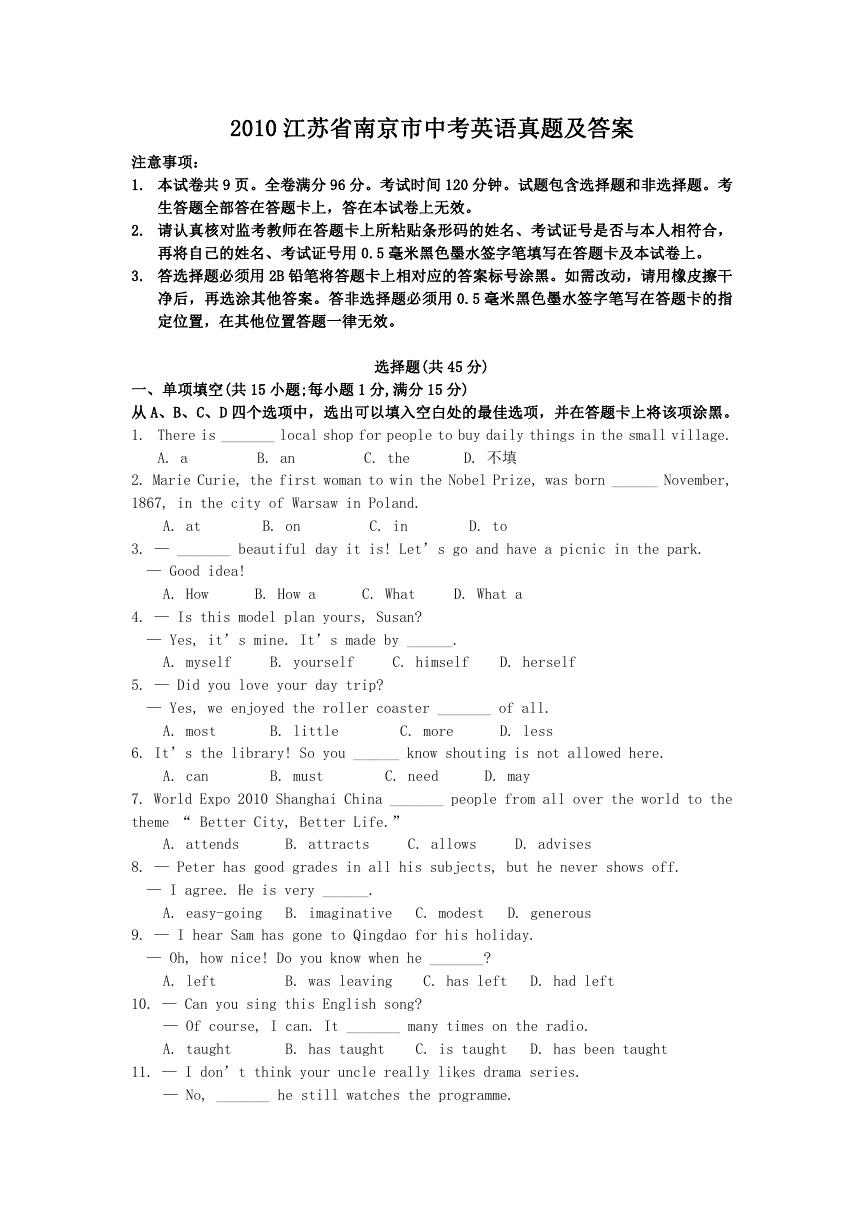
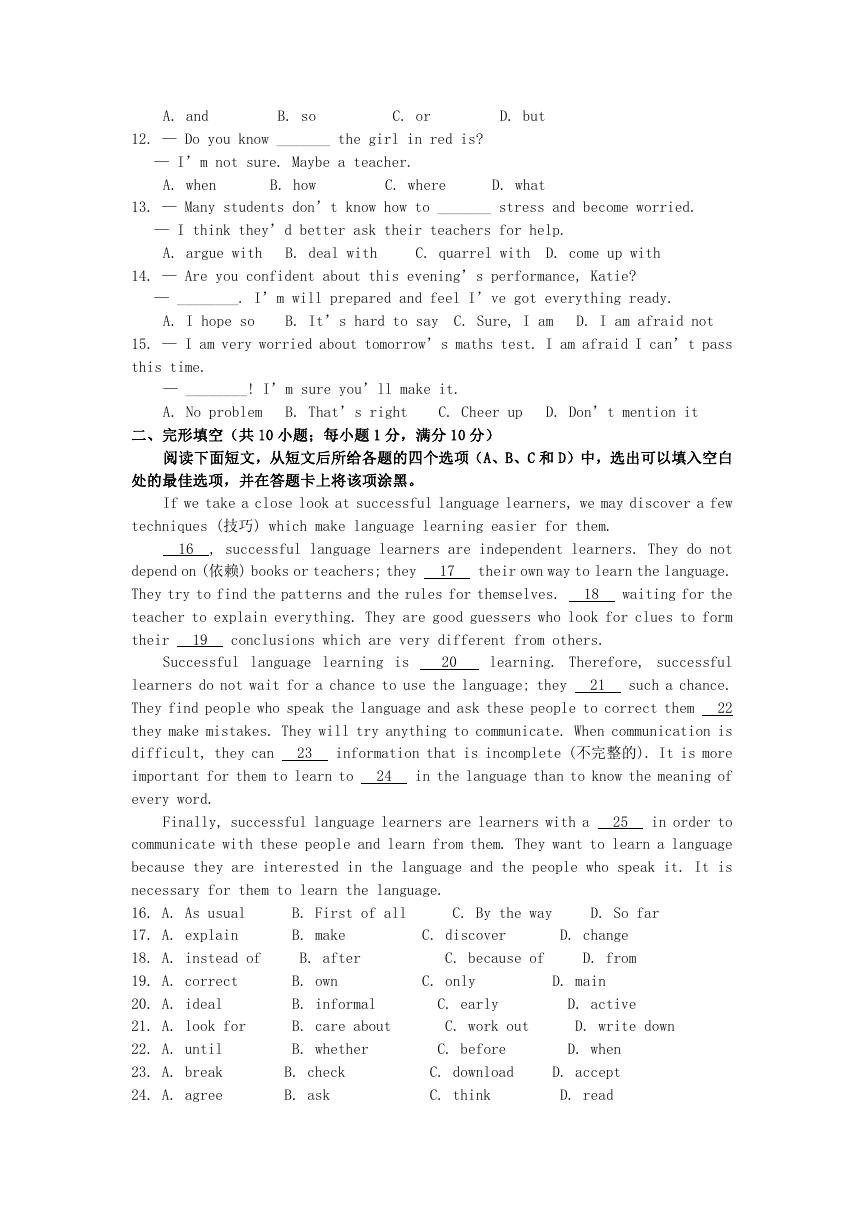
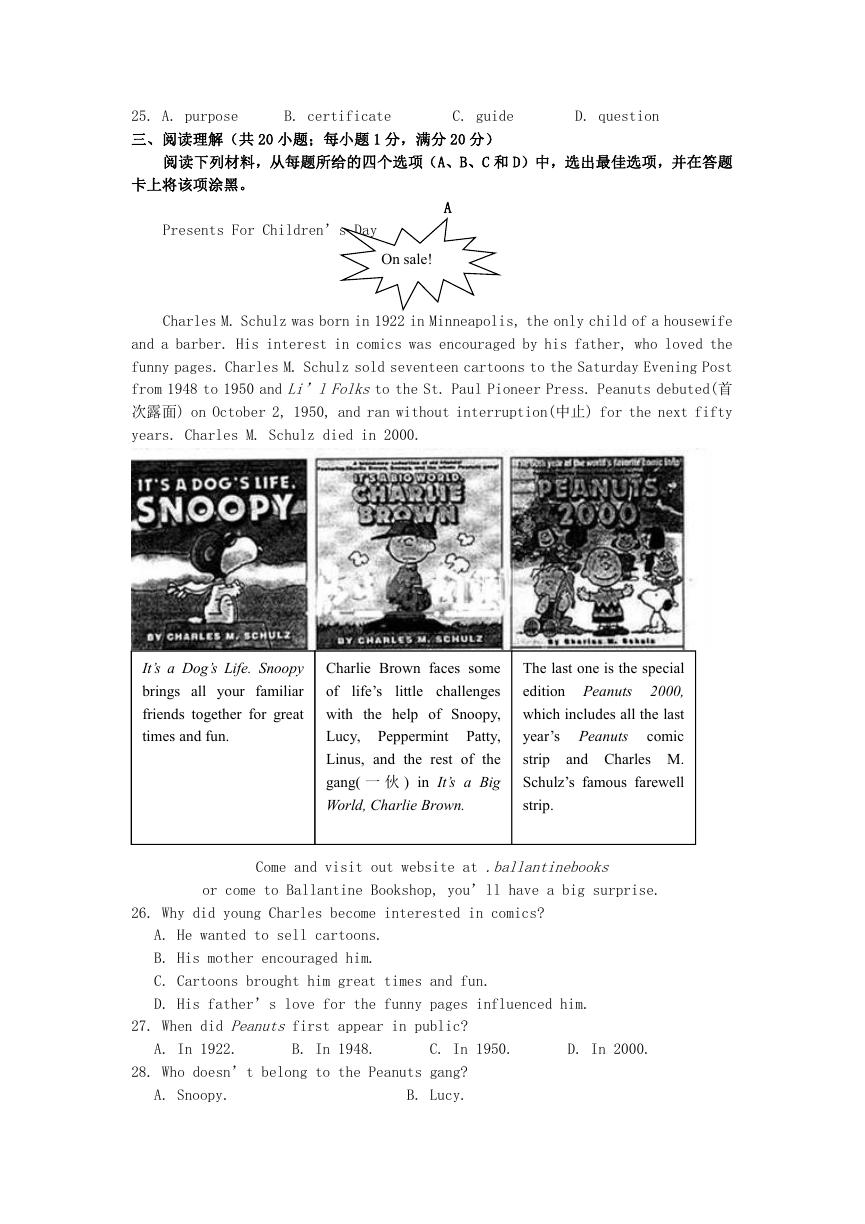
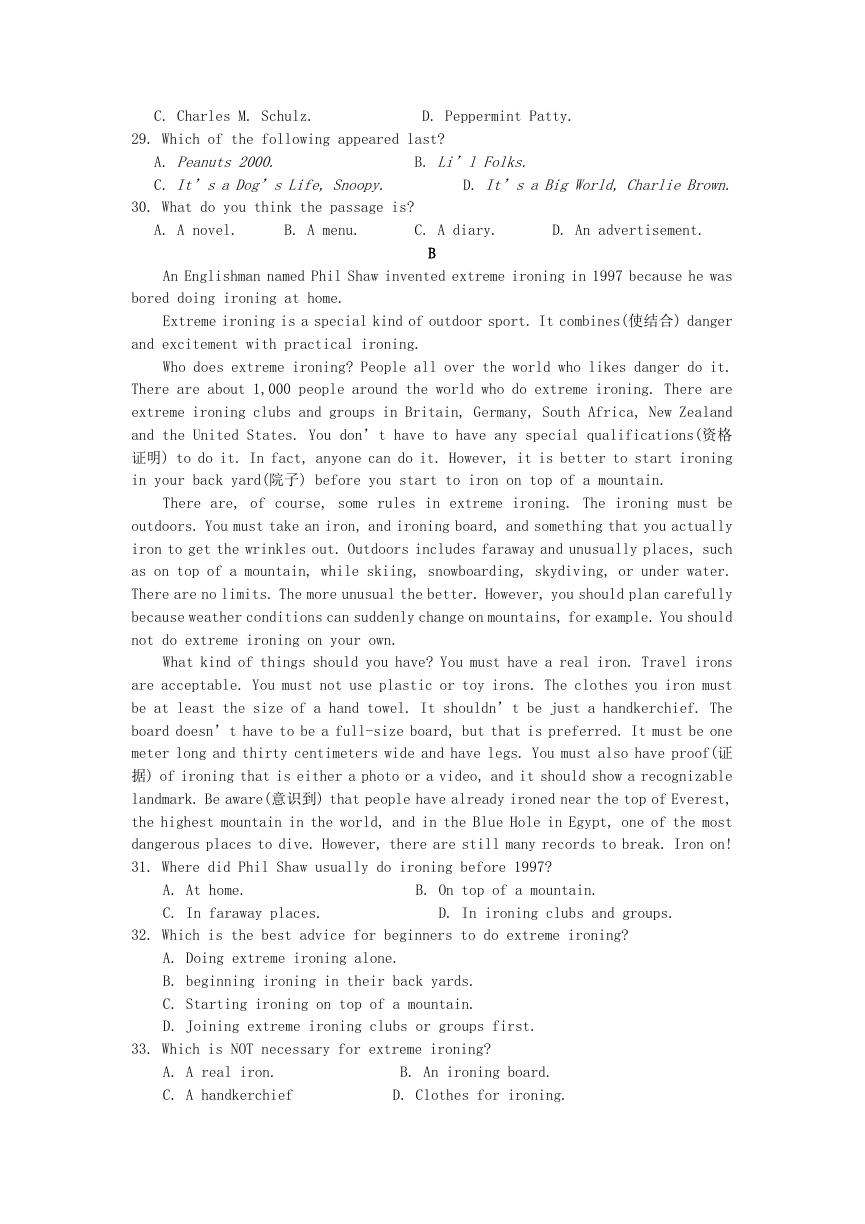
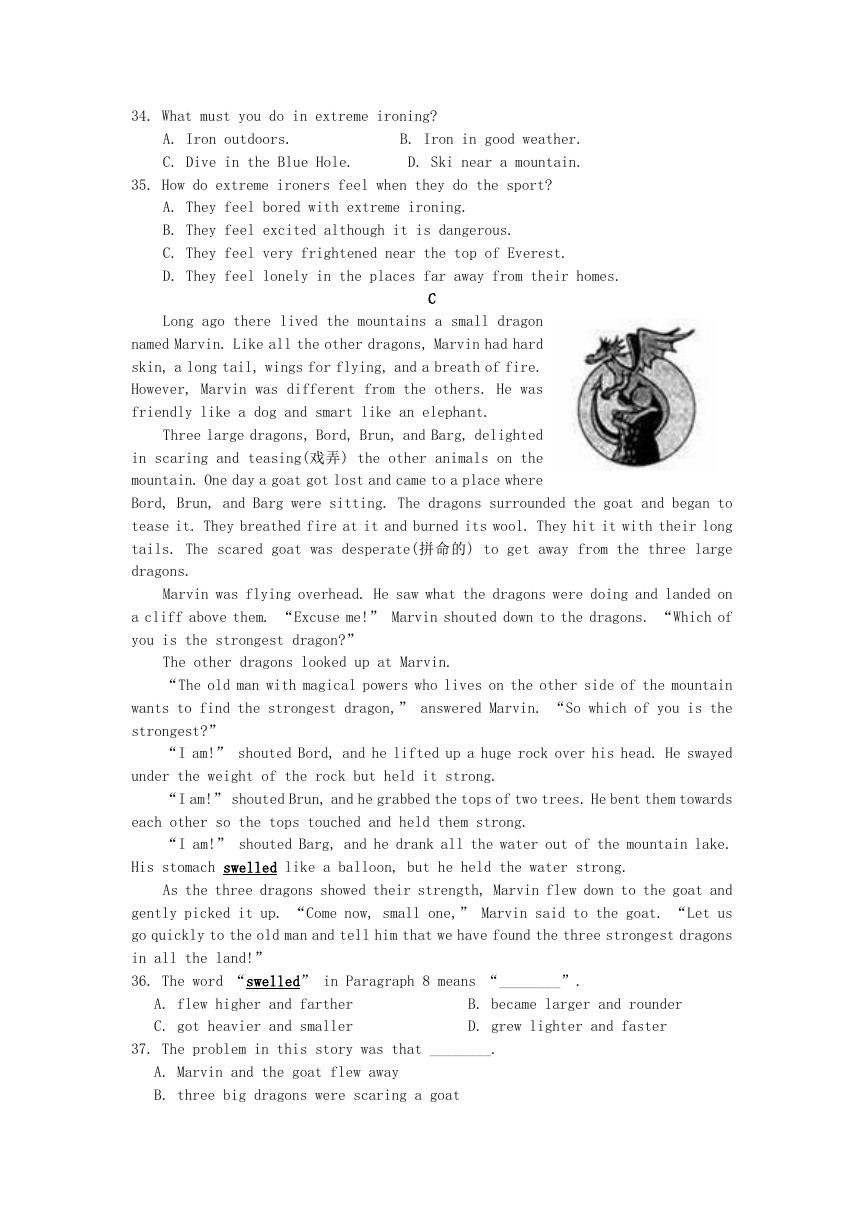

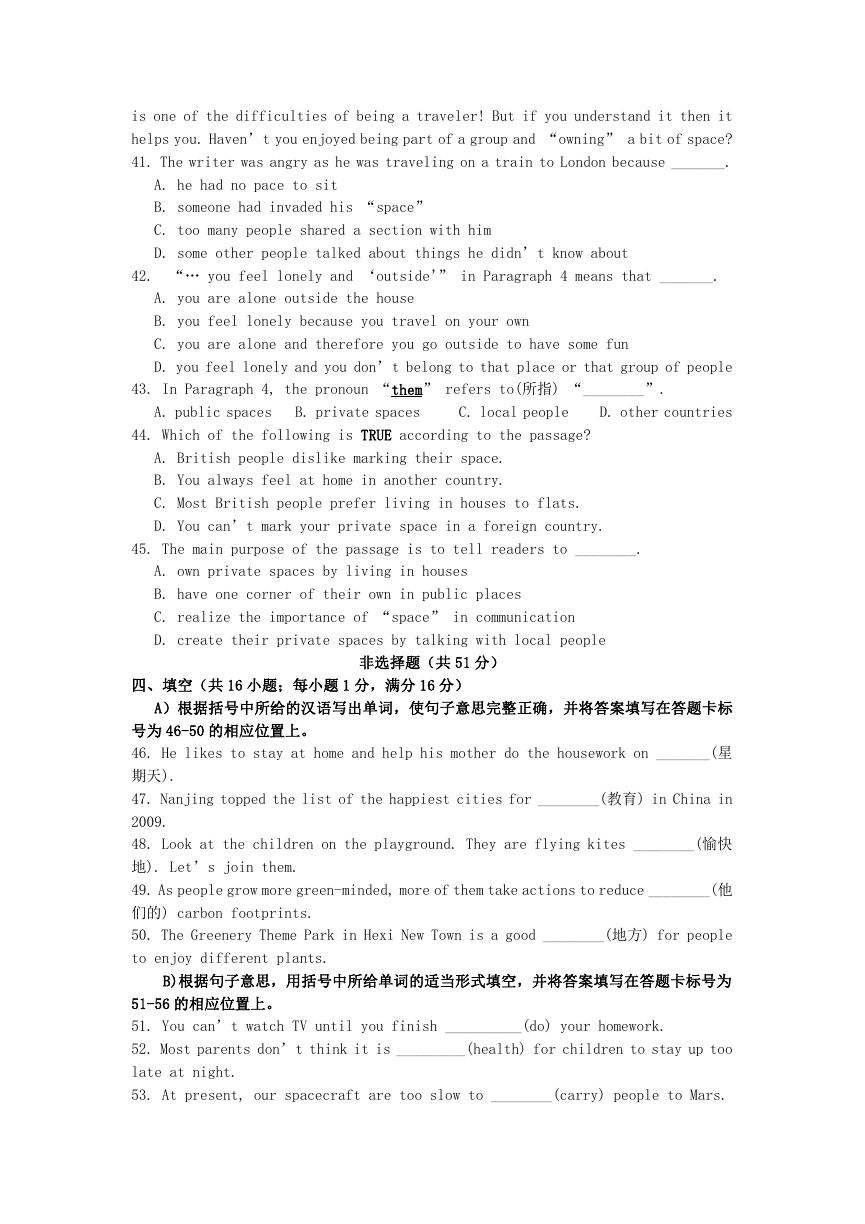
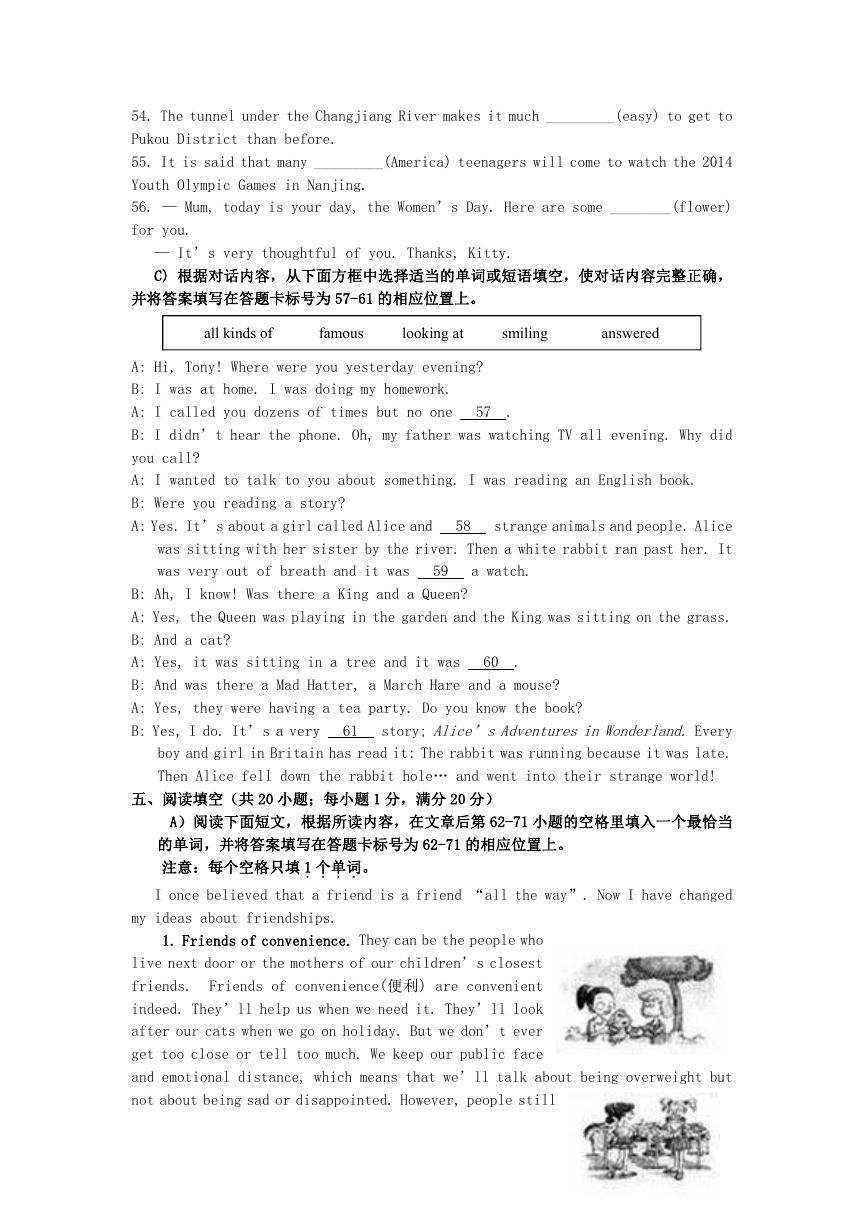








 2023年江西萍乡中考道德与法治真题及答案.doc
2023年江西萍乡中考道德与法治真题及答案.doc 2012年重庆南川中考生物真题及答案.doc
2012年重庆南川中考生物真题及答案.doc 2013年江西师范大学地理学综合及文艺理论基础考研真题.doc
2013年江西师范大学地理学综合及文艺理论基础考研真题.doc 2020年四川甘孜小升初语文真题及答案I卷.doc
2020年四川甘孜小升初语文真题及答案I卷.doc 2020年注册岩土工程师专业基础考试真题及答案.doc
2020年注册岩土工程师专业基础考试真题及答案.doc 2023-2024学年福建省厦门市九年级上学期数学月考试题及答案.doc
2023-2024学年福建省厦门市九年级上学期数学月考试题及答案.doc 2021-2022学年辽宁省沈阳市大东区九年级上学期语文期末试题及答案.doc
2021-2022学年辽宁省沈阳市大东区九年级上学期语文期末试题及答案.doc 2022-2023学年北京东城区初三第一学期物理期末试卷及答案.doc
2022-2023学年北京东城区初三第一学期物理期末试卷及答案.doc 2018上半年江西教师资格初中地理学科知识与教学能力真题及答案.doc
2018上半年江西教师资格初中地理学科知识与教学能力真题及答案.doc 2012年河北国家公务员申论考试真题及答案-省级.doc
2012年河北国家公务员申论考试真题及答案-省级.doc 2020-2021学年江苏省扬州市江都区邵樊片九年级上学期数学第一次质量检测试题及答案.doc
2020-2021学年江苏省扬州市江都区邵樊片九年级上学期数学第一次质量检测试题及答案.doc 2022下半年黑龙江教师资格证中学综合素质真题及答案.doc
2022下半年黑龙江教师资格证中学综合素质真题及答案.doc